Top Backgammon Books - Part 3
In this section, we delve deeper into the world of backgammon strategy and expertise. These books are tailored to players who have already grasped the basics and are eager to elevate their game to a competitive level. From advanced opening concepts to endgame techniques and insights from backgammon legends, this collection provides a wealth of knowledge and practical scenarios to sharpen your skills. Whether you’re striving to become a backgammon master or seeking to enhance your strategic thinking, these books offer invaluable guidance.
Let’s explore these titles that cover a wide spectrum of backgammon intricacies, tactics, and expert-level strategies. Whether you’re looking to refine your endgame technique or gain insights from seasoned players, this selection has something to offer for every aspiring backgammon aficionado.
1: Opening Concepts — Michihito Kageyama & Roland Herrera (2017)

This book is designed to improve your Backgammon skills by using proverbs that I have made. They represent the basic concepts in backgammon and play a major role in the book. You solve problems by applying suitable proverbs, then you will find the essence of the positions.In chapter 1 & 2, Beginner level, announcing 12 basic proverbs, which I really hope you will memorize.In chapter 3 & 4, Intermediate level, introducing you to 6 advanced proverbs. Together, these 18 proverbs cover most of the opening phase.In chapter 5, 6 and 7, Advanced level, I confront another 3 important concepts, tough even for advanced players.Appendix, Basics: If you are a new comer, you really should start from this chapter. I explain the basic and important three actions in backgammon. In my opinion, the more you understand Backgammon, the more you will enjoy it. I really hope this book helps you feel better while playing Backgammon, an unbelievably well-crafted game.
2: Endgame Technique — Michihito Kageyama & Roland Herrera (2019)
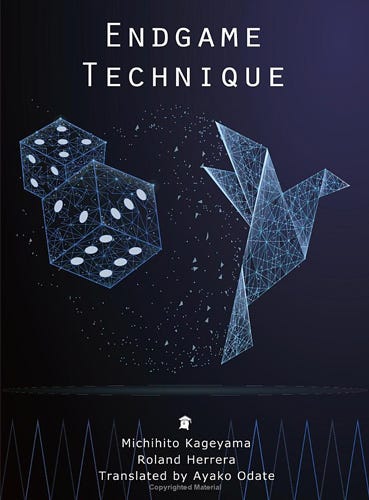
Michy Kageyama’s followup to his popular Opening Concepts (1917) fills a conspicuous gap in the backgammon literature. Nowhere else have we seen the routine mechanics of late-game checker play scenarios treated in such meticulous detail — which is a little surprising, given how frequently these situations arise. How do you bear off checkers against an ace-point anchor in order to minimize your chances of leaving a blot? How about a deuce-point anchor? How do you bear in checkers to your home-board and then bear them off most efficiently in a simple race? How do you decide when to break your deep anchor, or split your checkers, when you are desperate to induce a game-saving blot against your opponent’s bear-off? Even expert players who think they know all about these topics will discover surprising and subtle techniques to help squeeze every bit of equity out of the final phases of the game.
3: How To Play the Opening in Backgammon Series — Bill Robertie (2020)
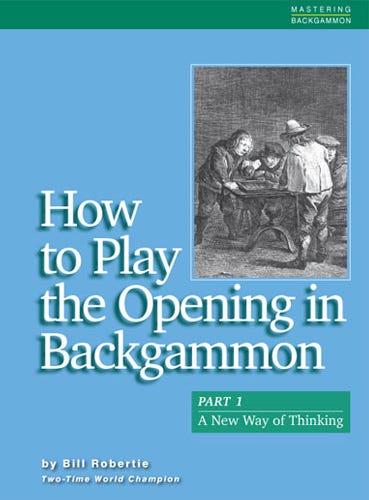
The opening is arguably the most important phase to master: every game’s got one. Here at last is a thorough treatment of the opening few exchanges in backgammon. While you may already know the best opening plays, Robertie offers a fresh take on how the various options compare in terms of assets and liabilities, while also providing intriguing historical notes on how professional practice evolved over the past century. And rather than pursuing the usual “rules & exceptions” approach to the opening replies, Robertie conveys the logic behind the most common default plays while also finding the common elements in smaller subsets of more difficult positions. Parts 1,2 and 3 are out, and the third is eagerly awaited.
4: The Zizka Method — Zdenek Zizka (2021)
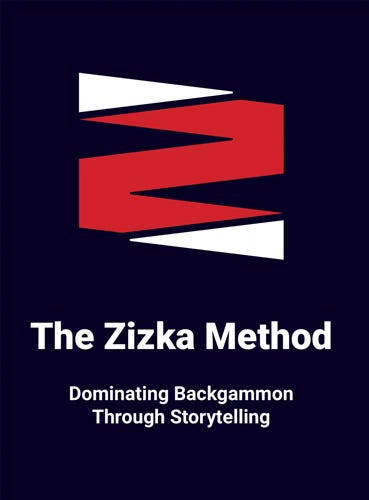
A great deal of backgammon wisdom takes the form of general principles, rules of thumb, or mathematical formulas for quantifying racing chances or solving cube decisions. But when none of your tools point confidently to a best play, what then? Zdenek Zizka’s “storytelling” method is an approach to reaching a conclusion by projecting “what rates to happen” in the ensuing exchange or two, often by breaking down your opponent’s immediate reply into subsets of useful or useless numbers. The informal tone of the writing won’t please everyone (and it’s riddled with typos), but it does capture the rough, over-the-board thought process the author is modeling. Zizka credits his youthful and meteoric rise in backgammon to his friend and teacher Mike “Falafel” Natanzon, who never published his methods, so we may be gaining some of them here.
5: Holding Game Guru — Jacob “Stick” Rice (2021)
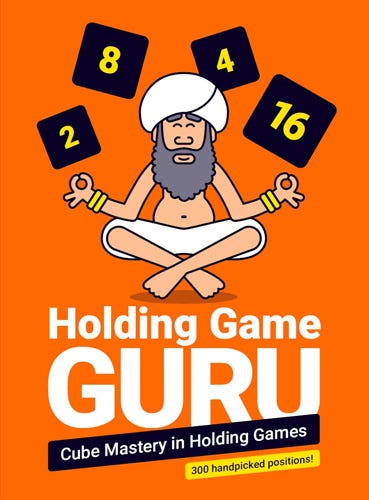
Studying holding game cube action is one of the best investments of time you can make as a competitive player. They just come up so regularly that you’re going to benefit over and over again for even small improvements in play. In this first book-length offering from respected author of the BackgammonVillage “Sticks and Stones” series of articles, Jacob “Stick” Rice shares his arsenal of four Rules and ten Reference Positions and then goes on to analyze a whopping 300 non-obvious holding game cube positions to thoroughly illustrate the considerations that lead to proper play. The positions don’t appear to be grouped or ordered in any particular way (there is a chapter division between the first and second halves of 150 positions, but no suggestion why), perhaps intended to emulate actual play, where every variety of holding game will appear at random. Rice’s analysis is concise and engagingly colloquial, modeling an approach to reasoning over the board that readers can hope to emulate.
6: The Theory of Backgammon — Dirk Schiemann (2021)
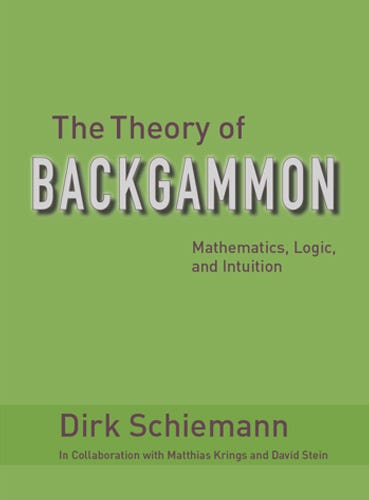
The “theory” laid out in this weighty tome isn’t for the serious beginner looking to start from the ground up with the basics. Rather, Schiemann lays out the mathematical considerations that govern optimal play in match and money play situations before pursuing a series of deep dives into a whole slate of specialized situations that bedevil already expert players looking to achieve world-class skills: doubling windows, cube efficiency, checker-play implications of cube ownership, adjusting play against stronger or weaker opponents, etc. Unlike many recent publications in backgammon, this handsome hardback book is professionally designed and typeset, reflecting the care Schiemann has taken with his analysis and editing, justifying the high price tag for those committed enough to seriously study its contents.
7: Backgammon Super Genius Quiz — James Vogl (2022)
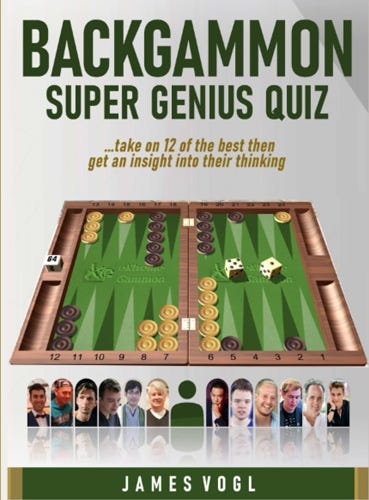
James Vogl hit upon a brilliant strategy for a book: assemble a slate of a dozen world-respected backgammon greats (including former Harvard Square BG denizen David Wells!) and have them vie for a $5000 prize by quizzing them on 100 super-tough positions he had gotten wrong over the board. Then present the same 10-section quiz to readers accompanied by pithy, focused commentary from the contestants and summaries of what can be learned from each topical set of 10 problems. The resulting book is incredibly engaging, as the reader is invited to self-score and compare their results to the running totals of the “super geniuses.” The book is full of memorable, useful “rules of thumb” and approaches to problem solving the reader can readily deploy over the board. While the graphics of the book have been lamented in some quarters (board diagrams are stretched screen shots of XG windows, making it hard to read the equity figures), the practical content and entertainment value of the book are easily worth the price of this softcover book.
8: Backgammon for Serious Players — Bill Robertie (2003)
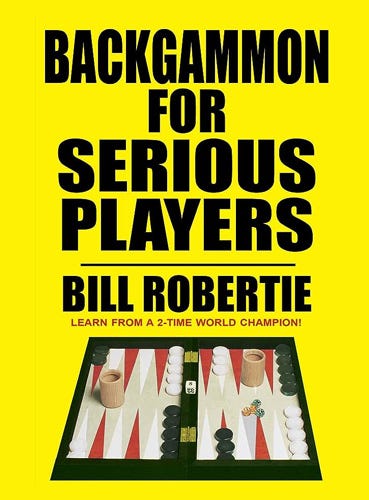
Bill Robertie’s expertise shines in “Backgammon for Serious Players.” This book caters to players seeking to elevate their game to a competitive level. Robertie dissects advanced strategies and explores critical aspects of tournament play.
9: The Backgammon Book — Oswald Jacoby and John R. Crawford (1970)
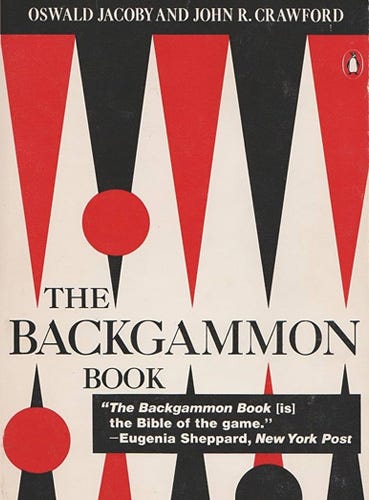
A classic in the realm of backgammon literature, this book by Oswald Jacoby and John R. Crawford has stood the test of time. It provides a comprehensive introduction to the game, covering rules, strategies, and techniques. An essential read for beginners and a valuable reference for experienced players.
10: Paradoxes and Probabilities: 168 Backgammon Problems — Barclay Cooke (1978)
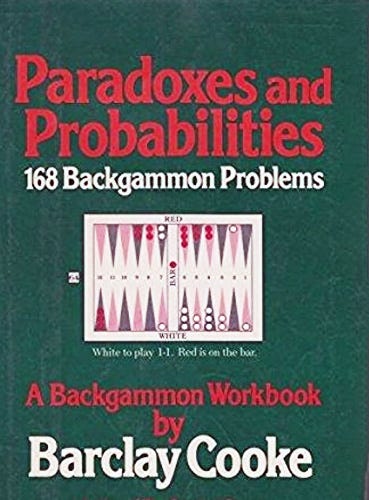
Barclay Cooke’s work delves into the intricacies of backgammon through a collection of 168 problems. Through thought-provoking scenarios, players are challenged to apply strategic thinking and probabilistic analysis to enhance their gameplay.
11: Backgammon Praxis Vol 1 & 2 — Marty Storer (2005)
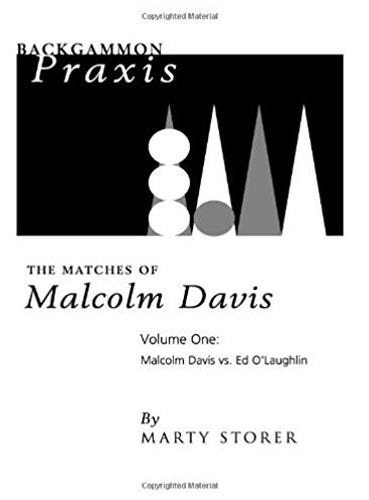
Marty Storer’s two-volume set, “Backgammon Praxis,” offers a wealth of insights for players looking to improve their skills. With a focus on real-world scenarios, this work guides readers through practical situations, fostering a deeper understanding of strategic decision-making.
12: 100 Backgammon Puzzles — Paul Lamford
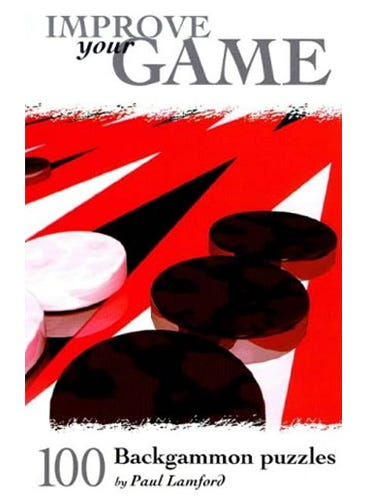
Paul Lamford presents a collection of 100 puzzles that challenge players’ tactical and strategic abilities. Through these engaging scenarios, players are encouraged to think critically and hone their problem-solving skills, enhancing their overall backgammon proficiency.
13: How to Play Tournament Backgammon — Kit Woolsey (2000)
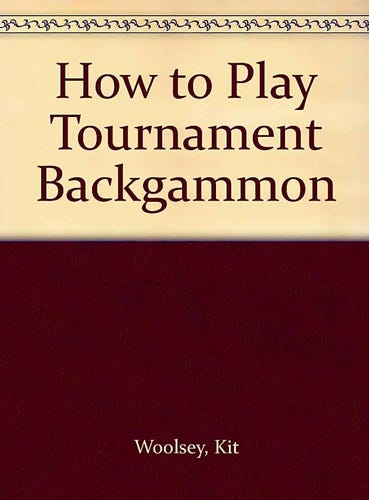
Kit Woolsey’s guide focuses on the dynamics of tournament backgammon. Through detailed explanations and analyses, players are equipped with the tools needed to navigate the unique challenges of competitive play and maximize their performance.
14: Cubes and Gammons near the End of the Match — Antonio Orthega & Danny Kleinman (1997)
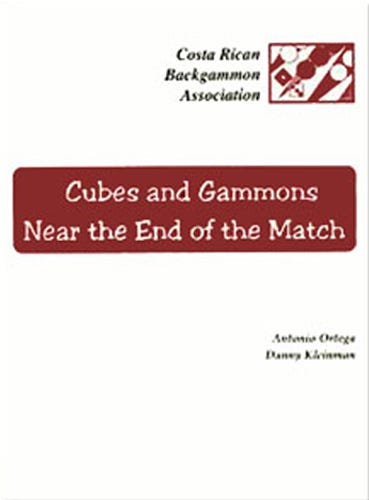
Antonio Orthega and Danny Kleinman dive into the intricacies of cube handling and gammons during the final stages of a match. This book provides essential insights into maximizing the value of the doubling cube and exploiting endgame situations.
Join Us to play backgammon online together at https://nextgammon.com
Comments
Post a Comment